

According to Charles Tilly...
"War made the state, and the state made war"

This week's essay emerges from a peculiar realization I've had over the years—consistently recognizing patterns in our societal structures that mirror childhood belief systems.
The catalyst was reflecting on how our most sacred institutions operate on logic similar to fairy tales we outgrew as children.
By exploring this "institutional Santa Claus complex," I hope to illuminate both the comfort and danger of living in a society built on such elaborate fictions. This piece confronts the mythology of institutional legitimacy while examining what happens when we start to question the fairy tales that govern our adult lives. It challenges us to reconsider the nature of the systems we've accepted as necessary and immutable, and asks whether we're truly as grown up as we think we are.

The Fairytale Collapse
What if we never stopped believing in fairy tales, but just rebranded them as institutions?
You want to know what's genuinely f@%ed up about modern civilization? We've built the entire thing on the developmental psychology of eight-year-olds.
Remember that exact moment when you figured out the Tooth Fairy was bullshit? Not the gradual suspicion—the precise instant when you caught your mom sneaking quarters under your pillow. That split second when you realized adults had been running an elaborate con to make you believe some benevolent entity was rewarding you for, what, exactly? Losing teeth? Some benevolent entity that rewards you for natural biological processes you have zero control over?
Well, congratulations. You've just described every major institution you interact with as an adult.
Your driver's license? Same exact con. The state hands you a magical piece of plastic that supposedly validates your right to exist in public spaces. Your bank account? Abstract numbers maintained by friendly authorities who definitely have your best interests at heart—just like Santa's elves keeping track of who's been naughty or nice. Your Social Security number? A mystical identifier that transforms you from a biological organism into a legitimate participant in the economic system.
We never actually grew up. We just graduated to more expensive fairy tales that can garnish your wages.
Most people sense this but never connect the dots. There's this nagging feeling that something's off about carrying papers to prove you exist, or needing permission to drive on roads you already paid for. But we've been so conditioned by childhood magical thinking that we accept it as just... how things work.
The Developmental Pathway We Never Question
The pattern is almost comically predictable. We literally train kids to surrender their sovereignty through a carefully designed progression:
Ages 3-7: Basic Magical Thinking
- Tooth Fairy: "Put that tooth under your pillow, and magical entities will reward your biological processes"
- Santa Claus: "Be good, and benevolent authorities will distribute resources based on your behavioral compliance"
Ages 15-25: Institutional Magical Thinking
- Government ID: "Get this document, and the authorities will validate that you exist"
- Financial Systems: "Open this account, and abstract numbers will represent your actual life energy"
Same psychological framework. Same surrender of autonomy for external validation. Same belief that pieces of plastic contain magical properties when blessed by the right authorities.
The only difference? Adult fairy tales come with late fees, criminal penalties, and armed enforcement.
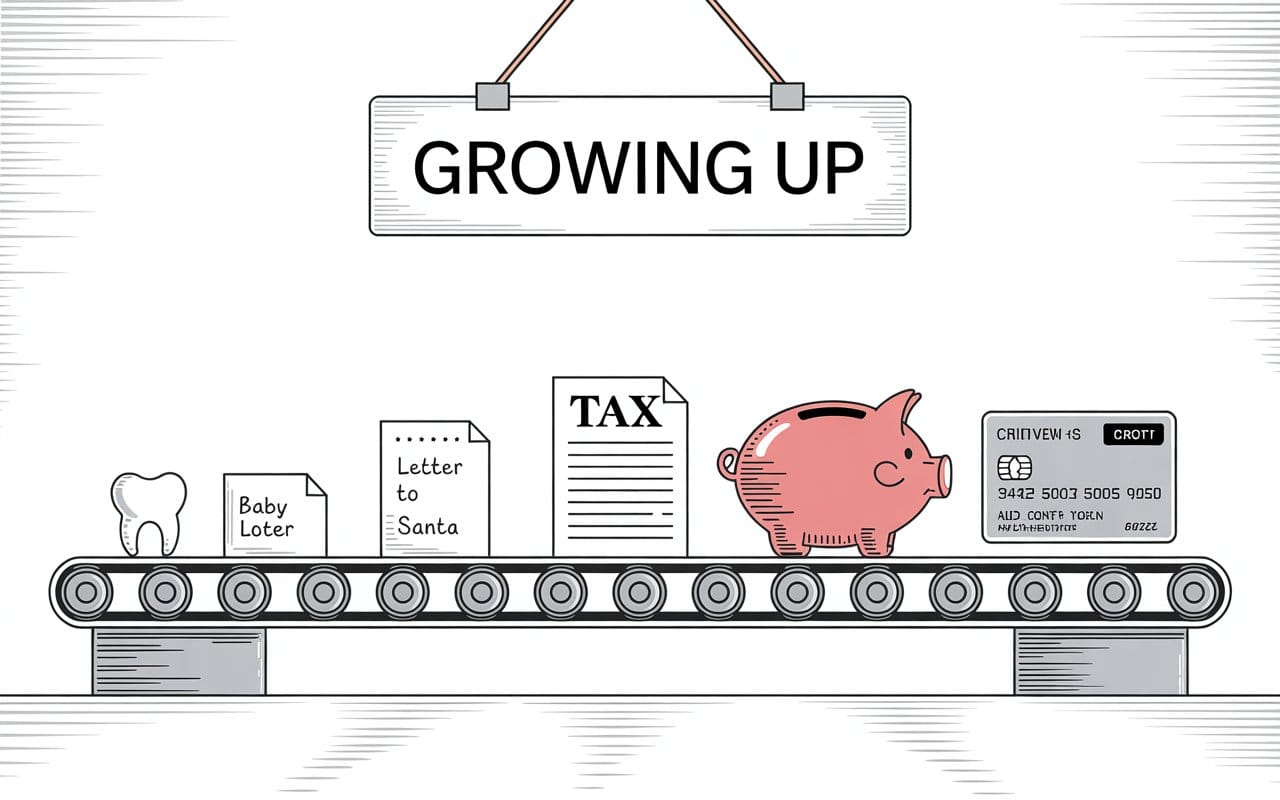
We've made this progression so seamless that questioning it feels almost... unpatriotic? When someone asks why they need permission to drive on roads they already paid for, people look at them like they're advocating for chaos rather than pointing out basic logic.
The Math Doesn't Add Up
This is where it stops being funny and starts being genuinely alarming. These institutions aren't just inefficient—they're designed to consume more energy than they produce, indefinitely.
Take banking. I actually mapped out what goes in versus what comes out:
What goes in: Millions of people spending their entire lives shuffling numbers in databases. Massive concrete monuments in every city center—ever notice banks always get prime real estate? Security systems, compliance departments, regulatory armies. Plus your personal time: how many hours did you spend dealing with banks this year? Forms, verification, hold music, driving to branches, reconciling statements, disputing charges.
What comes out: Interest on money they created from nothing.
That's not a business model. That's an extraction scheme disguised as customer service.
Or vehicle registration. You surrender biometric data, spend half a day in fluorescent-lit hell, pay fees, submit to background checks, and get... permission to drive on roads you already paid for. Enormous human energy input to create artificial scarcity around something that should be free.
Every major institution follows this pattern: massive energy input, negative value output, sustained by extracting from the people who need the service.
It's like we built civilization around casino economics, except the house edge is 100% and you can't leave the table.
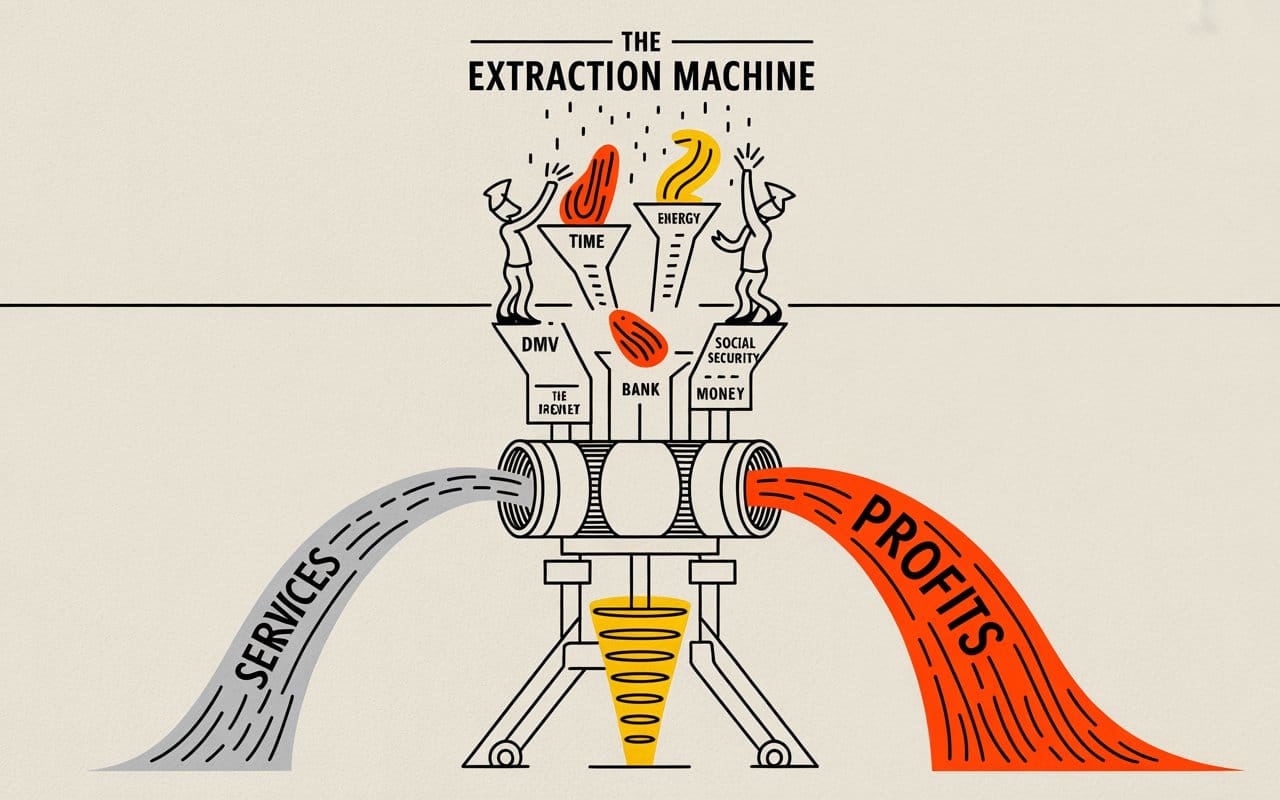
When the Magic Stops Working
Fairy tales have expiration dates.
The Tooth Fairy stops working when kids get smart enough to ask inconvenient questions: "How does she carry all those teeth?" or "Why does Tommy get five dollars but I only get one?" Institutional fairy tales stop working when enough people notice the math doesn't add up.
We're watching this happen right now:
- Money systems are hitting mathematical limits. You can't run exponential growth forever on a finite planet—this isn't economics, it's physics. The boom-bust cycles keep getting more extreme because the system needs bigger and bigger inputs to produce the same outputs. Eventually you run out of things to extract and the whole machine seizes up.
- Security theater is drowning in its own overhead. The TSA has burned through $100 billion since 2001 and never stopped a single terrorist—their own tests show 95% failure rates. The DMV processes 250 million transactions annually at $47 each to issue permission slips for things that were perfectly legal yesterday. YouTube now demands government ID to "verify" you're over 13 to watch a video—because apparently age verification for teenagers requires adult state documents. We're paying more to maintain the surveillance than we'd lose from the problems it supposedly prevents.
- Centralized Energy Systems are clinging to finite fossil fuel extraction while actively suppressing renewable alternatives that would eliminate their extraction revenues. They're literally choosing thermodynamic collapse over institutional adaptation because admitting abundance would destroy their scarcity-based business model.
The thermodynamic debt from all these systems is accumulating faster than the institutions can extract energy to service it. When extraction systems consume more energy than they extract, collapse becomes mathematically inevitable. Not political, not economic—mathematical.
The Recognition Threshold Moment
What's fascinating is watching people hit the recognition threshold in real time. It's not gradual—it's like those optical illusions where you suddenly see the hidden image and can never unsee it.
Last month I watched someone at the DMV have this exact moment. Three hours waiting to renew a piece of plastic that gives them permission to do something they were doing perfectly fine yesterday. They looked around and asked, out loud: "What the fuck is this actually for?"
That's the moment. Once you see it, you can't unsee it. Every interaction becomes conscious participation in your own extraction.
A friend spent one evening calculating how much of his paycheck goes to servicing debt on money that was created from nothing—mortgage interest, credit cards, student loans, inflation. Forty percent. The lights came on: This isn't economic participation. This is wealth extraction through artificial scarcity.
The Institutional Panic Response
What's telling is how institutions respond when people start asking these questions. Instead of addressing the logical inconsistencies, they double down on enforcement and pile on more compliance layers.
Can't afford your car registration? They suspend your license, making it illegal to drive to work to earn money to pay the fee. Question any mandate? They restrict your access to employment, travel, and basic services until you comply. Point out that taxation without representation is theft? Audit time.
The response reveals what these systems actually are: not services you want, but dependencies you can't escape.
But here's what's unprecedented: for the first time in history, we have technological alternatives that make these intermediaries unnecessary. Personal energy generation. Cryptographic identity. Peer-to-peer transactions. Mesh networks.
The fairy tales become optional when you have working alternatives.
Beyond Institutional Dependency
The revolutionary insight isn't that these systems are corrupt—corruption implies they're broken. These systems are functioning exactly as designed. They're supposed to extract more than they provide. That's the business model.
Which means reform is impossible. You can't fix a perpetual motion machine by adjusting the gears. You need completely different architecture that works with reality instead of against it.
Personal energy generation instead of utility bills. Cryptographic identity instead of paper documents. Peer-to-peer transactions instead of banking fees. Mesh networks instead of centralized control.

The goal isn't better fairy tales—it's infrastructure that makes institutional validation irrelevant.
When the Magic Runs Out
The recognition is spreading faster than institutions can adapt. People are realizing that trading autonomy for institutional validation is a losing game.
The response isn't reforming these systems—they're extraction machines by design. The response is building alternatives that work while the old systems exhaust themselves.
Your driver's license is Santa Claus with government backing. Your bank account is the Tooth Fairy with compound interest. Your Social Security number is magical thinking with enforcement mechanisms.
The question isn't whether these fairy tales will collapse. The question is whether you'll have working alternatives when they do.

Don't miss the weekly roundup of articles and videos from the week in the form of these Pearls of Wisdom. Click to listen in and learn about tomorrow, today.

Sign up now to read the post and get access to the full library of posts for subscribers only.

Khayyam Wakil studies how institutions consume more energy than they create. His work on "thermodynamic debt" explores civilization-scale extraction patterns and post-scarcity alternatives. When not mapping institutional absurdities at sparsely-attended conferences, he's designing systems that don't require permission slips to function—and still can't believe we need plastic cards to prove we exist.

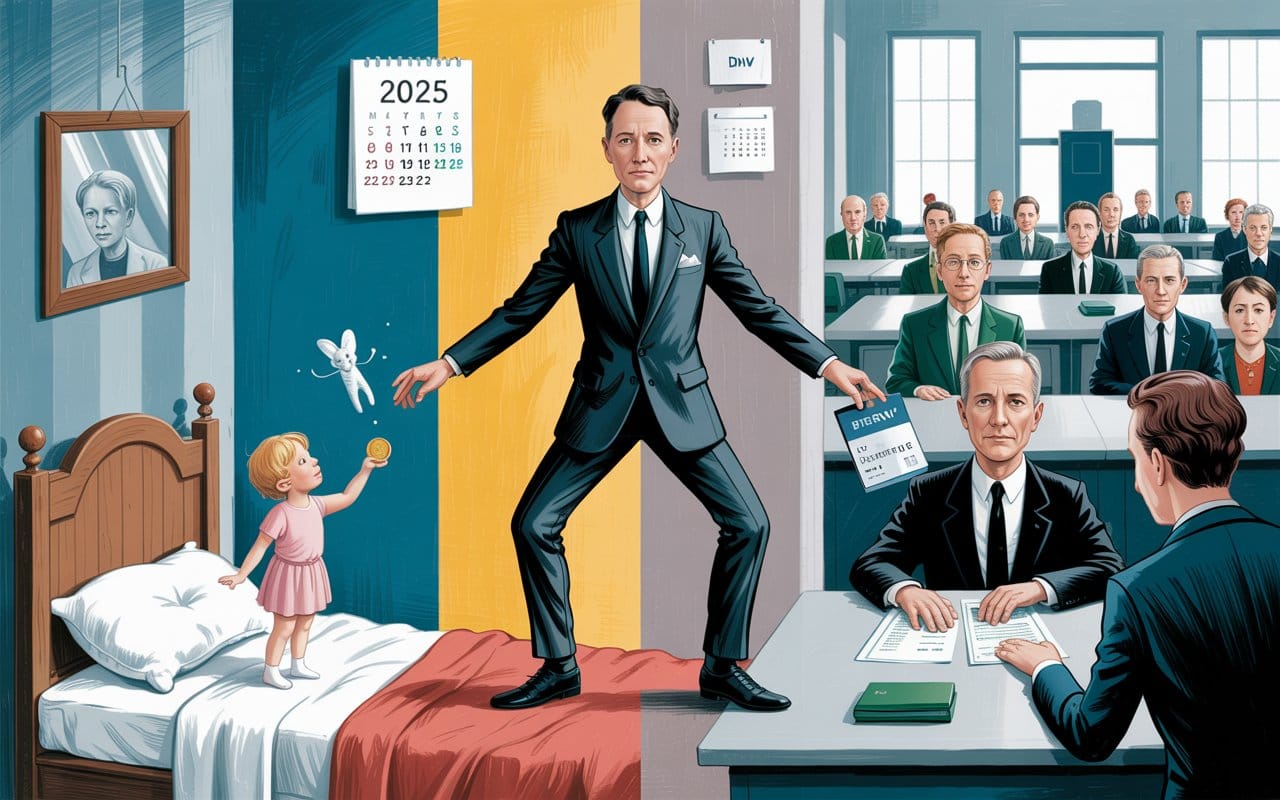



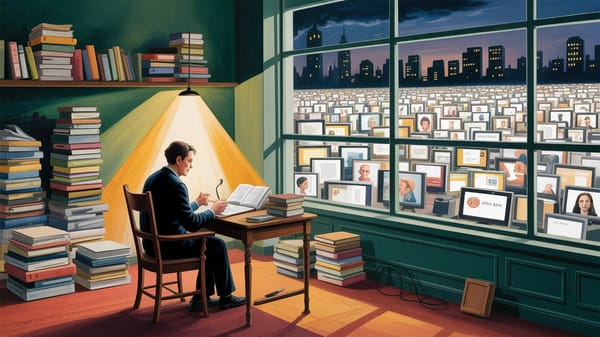
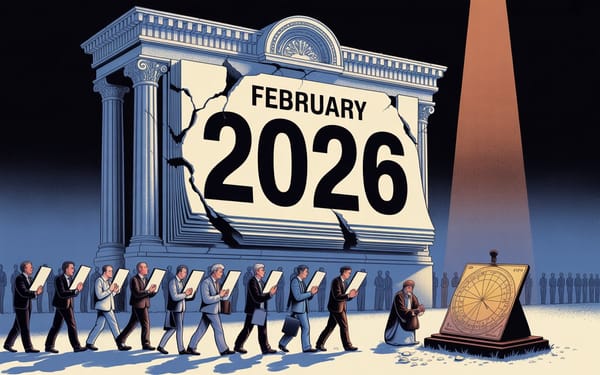
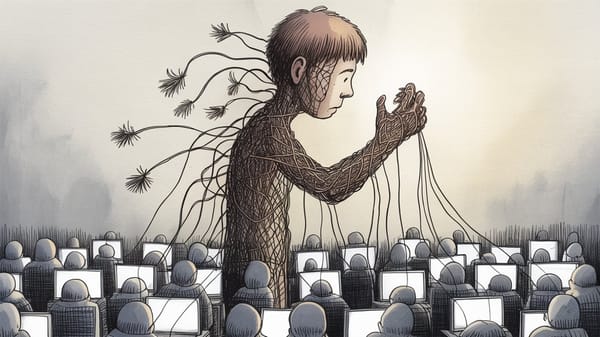
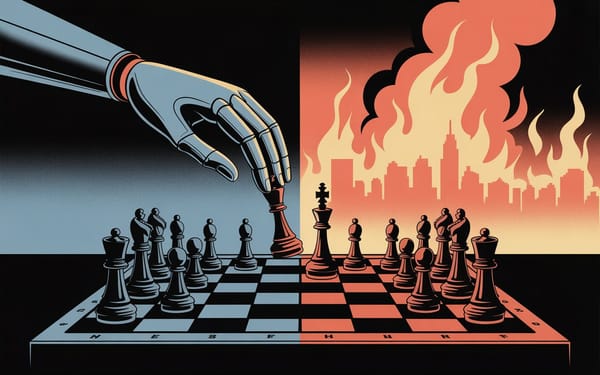
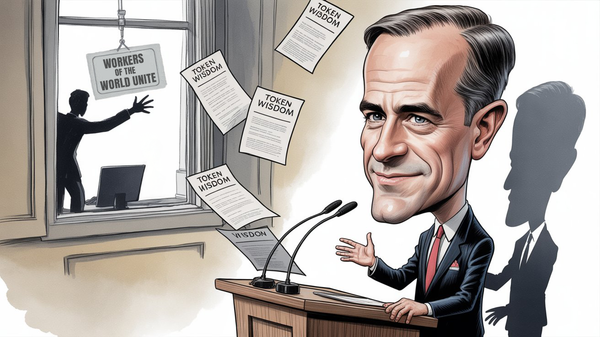
Member discussion